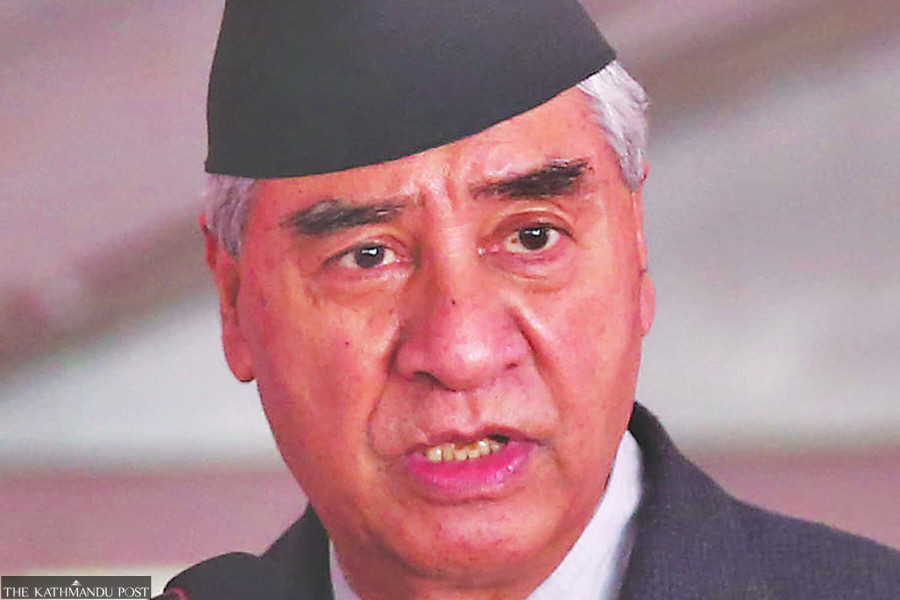Politics
Deuba’s grip on Congress firm despite losing power
Revival hope in doubt with leadership change unlikely soon.
Purushottam Poudel
With the Nepali Congress, the largest party in Parliament, unable to form a new government, a question is being raised: Can the Congress revive itself under the leadership of its current chief Sher Bahadur Deuba?
Congress President Deuba, who is considered a canny politician who can cobble together even unwieldy coalitions, however, this time failed to turn the situation in his favour. Though the Congress-led electoral alliance was close to a majority, it was outfoxed by rival leaders and a parallel coalition was formed under the leadership of CPN-UML. The leadership of the second-largest party, UML, not only succeeded in breaking the Congress-led alliance, it also formed a new government under the leadership of the third-largest party, CPN (Maoist Centre), on December 25.
As things stand, the Congress seems to be losing vital state positions such as President, Vice-President, and Speaker of the House to the UML-led alliance. Had it been able to keep the electoral alliance intact, the party would have enjoyed the largest share in these positions, including some chief ministerial posts in seven provinces.
On the question of Deuba’s leadership, those close to him believe the party can still revive under his leadership. But other leaders assert that the party has no future under Deuba.
When the Post asked if the Congress can restore its lustre under Deuba, party vice-president and Deuba confidant Purna Bahadur Khadka refused to answer.
“You have to give me some more time to answer this question. I will answer it only after the party’s central committee meeting,” he said.
The party has called its central committee meeting for January 12. The meeting is expected to discuss the party’s failure to form government despite being the largest party in the House of Representatives.
Another leader from the Deuba camp, Gyanendra Bahadur Karki, said the party can definitely revive under Deuba. “Several leaders in the party are questioning his leadership, but I would like to ask them: Under whose leadership did the Congress become the largest party in Parliament?” Indeed, the Congress parliamentary party meeting on Saturday lauded Deuba for making Congress the largest party in parliament, with 89 of the 275 House of Representatives seats.
Leaders of the rival camp disagree.
“The Congress went into recent elections by forging an alliance but that did not work as expected,” Gururaj Ghimire, a Congress leader of the rival camp, told the Post. “Time and again, the Congress gets humiliated due to Deuba. The party cannot progress under his leadership.”
Ghimire said the declining public opinion of the current leadership is another thing to worry about.
The party had won 23 seats under the direct electoral system in the 2017 elections under Deuba’s leadership. Some party leaders had then raised a huge hue and cry, claiming that the party wouldn’t advance under Deuba. Yet Deuba was reelected Congress president at the party’s 14th general convention in 2021.
“Right now, the Congress needs a new leadership that the public trusts,” Geja Sharma Wagle, a political analyst close to the Congress, told the Post. “The party should even revisit its ideology in the changed context and in view of the aspirations of the new generation.”
He said party leaders should learn from past flaws; otherwise, Congress cannot revive itself.
Even though the party has a strong hold in its traditional constituencies, new outfits like the Rastriya Swatantra Party made significant gains in the elections just because the public is losing faith in traditional parties, Wagle said.
But senior journalist Purushottam Dahal claimed that the Congress cannot revive until the party has collective leadership. “The question is not about Deuba’s leadership alone. The party’s many problems will not be resolved unless it has collective leadership,” Dahal said.
In the election for Congress parliamentary party leader held on December 21, Deuba, who was prime minister at the time, won the race with 64 lawmakers' support, whereas his competitor Gagan Thapa, who is also a general secretary, could garner just 25 votes. The Congress has 89 members in the House of Representatives.
Although the election for parliamentary party leadership was held ahead of a dramatic change in intra-party power relations, party leaders say with Deuba in command, there has been no substantive change in power equations in the party and the party chief still holds sway. Even the equations in provincial assemblies suggest so. Leaders close to Deuba won the elections for the party's provincial assembly leadership in each of the seven provinces.
“In the elections, Deuba gave tickets only to those loyal to him, and this later reflected in the election of the provincial parliamentary party leadership,” said Ghimire.
At present, the prospect of the party thinking of Deuba’s alternative is slim as the majority of its lawmakers as well as central committee members are in the party president’s favour, say other political experts.
“Even if Deuba is to be ousted from party leadership, it should be done through a proper process, for instance a special convention,” another political analyst Purushottam Basnet told the Post. “But the chances of that are very slim.”




 13.12°C Kathmandu
13.12°C Kathmandu














